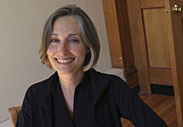Hot Sparks glow warmer
Linda Cooper has a mission: To make every newspaper, magazine or scholarly journal's research story engaging, clear and easy to read. This is a tough task in a world filled with bloated jargon, academese and dangling participles.

Linda Cooper
Owen Egan
She has held workshops on science writing for medical professionals around Europe and North America, and teaches Science Writing and Publishing at McGill for graduate students. Since 2002, Cooper has run the Students Promoting Awareness of Research Knowledge program (SPARK), a writing workshop for students to teach them the skills for communicating scientific research through the media to an intelligent readership.
Cooper, affiliated with the faculty of science, believes it's crucial for writers and academics to be able to convey complex ideas to the general public: "Not to oversimplify what people do, but to keep the [research's] meaning intact, to make it as accessible as possible," she says.
This year, SPARK is expanding to WARM-SPARK (Writing About Research at McGill) to include social sciences and the humanities. Originally, the SPARK initiative was funded by the Natural Sciences and Engineering Research Council. When McGill's vice-principal (research) office received some money from the Social Sciences and Humanities Research Council as reimbursement for a consultation exercise, they decided to reinvest it in human sciences communications, said research communications officer Jennifer Towell. Cooper's success and her ability to mentor the students made the question of where to put the funds a no-brainer, she added.
Under Cooper's enthusiastic guidance, students choose research-ers to interview and write about. The stories are then pitched to different media, from McGill's Reporter to the Globe and Mail. The group meets once a week to go over each other's writing and discusses the tangled aspects of scholarly work at McGill. Not only do the students explore different disciplines through the researchers they talk to, they are also exposed to the varied backgrounds of the group members.
The experience of crafting the stories is as valuable to the students as it is for those who end up reading them. Cooper says, "It helps you learn about diverse areas of research at McGill and is a really good way to foster awareness of interdisciplinary, groundbreaking research at McGill."
They put good use to the skills they learn. Past SPARKers have gone on to freelance successfully for major papers, continue graduate studies in top-notch schools, and one got an internship at a UN organization.
"When they deconstruct each other's text, it gives them a whole new understanding of the subject. Everyone asks clarifying questions," Cooper says.
Kim Krieger, who went on to intern at the American Association for the Advancement of Science and is now a freelance writer, states in an email: "Before SPARK I had no idea good writing about science was valued, much less that anyone would pay me to do it. Now communicating scientific ideas by the written word is my career.
"Every day I get to ask world-famous scientists stupid questions — and then tell the world what they say. It's the ultimate job for someone with endless curiosity and a talent for storytelling."
"It's always good to have a writing community," Cooper adds. "And it's fun! It's a lot of fun. The students are bright and curious. They're dynamic. There's an energy to the group."
See www.spark.mcgill.ca for past work. Interested in joining? Get in touch with Cooper at linda.cooper@mcgill.ca. Open to undergraduate and graduate students.
